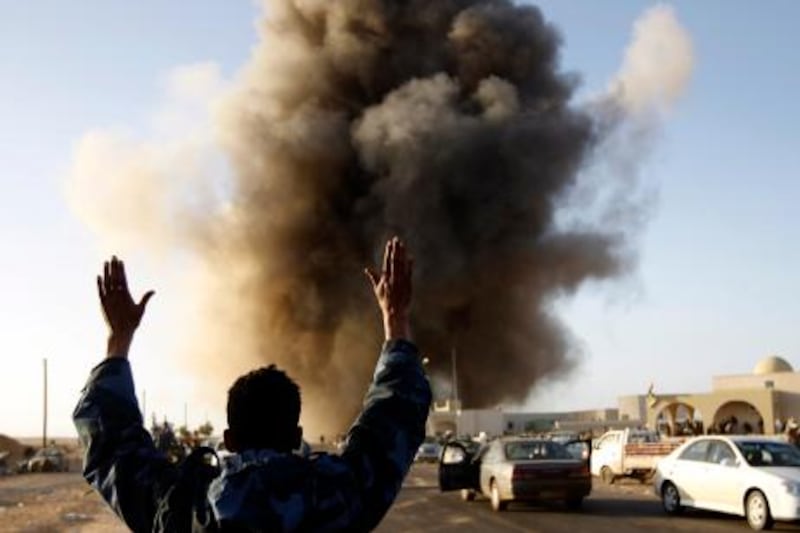ABU DHABI // The Gulf states last night threw their weight behind the idea of a no-fly zone over Libya, as they took a tougher line against what they termed human rights violations by Col Muammar Qaddafi's regime.
"The ministerial council demands that the Security Council take the steps necessary to protect civilians, including a no-fly zone in Libya," the Gulf's foreign ministers said in a joint statement late last night after a meeting at the Emirates Palace hotel.
Calls for the imposition of a no-fly zone to protect rebels from bombing raids by Col Qaddafi's military have been gathering pace in recent days.
Gulf officials expressed growing frustration with Col Qaddafi's violent repression of rebels calling for an end to his four decades of rule, saying Libyan authorities have rejected humanitarian aid from the Gulf and refused to distribute it to its citizens.
An aid package to Bahrain and Oman - Gulf states that have experienced local unrest - is under discussion and could be finalised as early as Thursday, officials also said.
They called on the Arab League to convene an emergency meeting to discuss the Libyan crisis.
Sheikh Abdullah bin Zayed, the UAE's Minister of Foreign Affairs, speaking at a press conference after the meeting, said: "What is happening in Libya is painful and aggravating to every human being."
He spoke of the plight of refugees stranded near Libya's borders, and the need to deliver humanitarian and medical aid to people affected by the crisis, saying Gulf countries were trying their best to deliver aid.
While the UAE and Turkey have launched such a programme, Sheikh Abdullah said there had been attempts for over a week to deliver aid to the Libyan people, but Col Qaddafi's regime had refused the supplies.
"We have faced absolute refusal from Libyan authorities on receiving and delivering this aid to those with a desperate need for it," said Sheikh Abdullah.
"The Libyan situation is not only that there are military operations against civilians, but there is also deprivation of aid to these civilians," he added.
The Gulf ministers condemned "the crimes committed against civilians using heavy weaponry and live ammunition" as well as Col Qaddafi's employment of foreign mercenaries against his people.
This constituted a "dangerous violation of human rights and international law", the ministers said.
They called on the Libyan regime to "immediately halt the use of force against civilians", ease the passage of humanitarian aid and "accomplish the aspirations of the brotherly people of Libya".
In opening remarks at the meeting, the GCC's secretary general called the regime's actions in Libya a crime against humanity.
The unrest in Bahrain and Oman, where protester demands ranged from a move towards constitutional monarchy to better employment opportunities and fighting corruption, took centre stage at the meeting, with public expressions of support for the leadership in the two countries.
The foreign ministers will convene again for a follow-up meeting on Thursday in Riyadh.
Bahrain's foreign minister said in an interview after the meeting that he expected the details of a GCC aid package to Bahrain and Oman to be finalised there.
"We haven't finalised our work and it will be announced properly in Riyadh on Thursday," said Sheikh Khalid al Khalifa. "Whatever Bahrain needs and the people of Bahrain need will be addressed by the rest of our group."
He said the aid package would deal with issues pertaining to the "livelihood of our citizens" and will "answer the needs of our people", but declined to go into specifics.
Sheikh Khalid also expressed optimism regarding the prospects of national dialogue with opposition protesters in his country led by Crown Prince Salman bin Hamad al Khalifa.
He said dialogue was likely to begin by the end of this week or early next week.
"We are used to dialogue," he said. "We are not used to fighting each other, so dialogue is the way forward and we are optimistic that it will happen."
"There is no doubt that the role of the neighbours is paramount for our stability," said Sheikh Khalid when asked about the role of Bahrain's neighbours in supporting the reform efforts.
Oman fired 12 cabinet ministers on Monday, and its foreign minister, Yusuf bin Alawi, said that was the beginning of a reform effort. He also said the Sultanate could afford to rely less on foreign labour - a step that would mean more employment opportunities for Omani citizens.
At the press conference, Sheikh Abdullah also said the UAE would not respond to a proposal in the Iranian parliament to downgrade relations with the UAE over alleged mistreatment of Iranians and dissatisfaction with some of the UAE's political positions.
"We haven't got an official response or a position from the Iranian side regarding this matter," said Sheikh Abdullah.
"Obviously in any legislative body you always have views and counter-views which we respect," he said. "But as long as it's not a government position I think it's just right for us not to respond to."
kshaheen@thenational.ae







